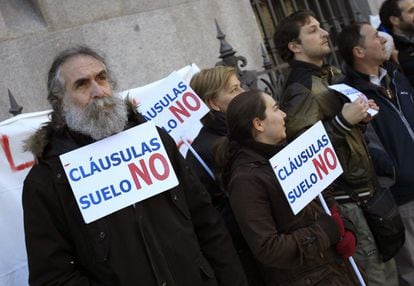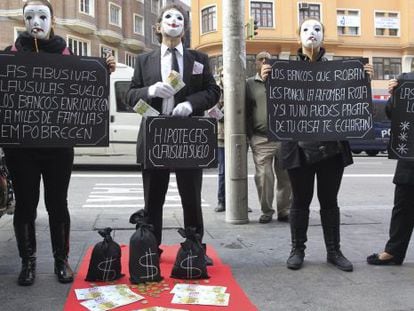EU orders Spain’s banks to repay all earnings from “abusive” mortgages
Ruling which cannot be appealed means lenders now have to refund €3 billion earned before 2013

The European Court of Justice (ECJ) on Wednesday ruled that a Spanish Supreme Court decision capping lenders’ liability for so-called “floor clauses” (cláusulas suelo) contravened European law and was unfair to customers.

These clauses set a “floor” or minimum interest rate that clients have to pay the bank, even if the benchmark rate – normally the Euribor – drops below that rate. However, with the Euribor rate dropping to historical lows in late 2008, customers with these loans failed to benefit.
There are some 2.5 million mortages with so-called “floor clauses” in Spain
Spain’s banking industry has been on tenterhooks in the lead-up to Tuesday's decision as it waited to learn if refunds would only date to 2013, or whether the refunds would be applied retroactively to 2009 on, the year in which the banks began to apply floor clauses. With some 2.5 million mortgages with floor clauses in Spain, the difference is huge: estimated at between €3 billion and €5 billion.
In its ruling, which cannot be appealed, the ECJ said the Spanish Supreme Court’s 2013 decision to limit refunds to the period from May 2013 on – a ruling made to protect a debt-ridden Spanish banking sector still reeling from the bank bailout – “failed to provide complete protection” to consumers” and “did not constitute an adequate and efficient means of an end to abusive clauses.”
In July, an EU Advocate General praised the Supreme Court’s role in protecting the banking sector under exceptional circumstances, a statement which gave lenders hope for a favorable decision.
However in what is a serious setback for the sector, the ECJ has now decided to protect consumers‘ interests.
Shortly after the ECJ handed down its sentence, lenders experienced sharp falls on the Madrid Stock Exchange, with Banco Popular and Sabadell losing more than 6% of their value.
The ECJ ruled the Spanish Supreme Court’s decision to cap liability failed to protect consumers
BBVA, La Caixa and Banco Popular are thought to be most exposed in the wake of the ECJ‘s decision, with the main focus on Banco Popular after the recent departure of long-term chairman Angel Ron in the wake of the institution’s poor performance.
English version by George Mills.











































